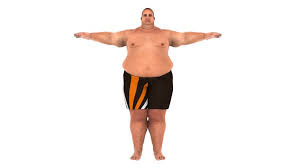
Body positivity began as a powerful antidote to the media’s obsession with skeletal models and glamour girls. Empowering women of non-Barbie proportions to feel good about themselves, the movement has attacked impossible beauty ideals that confront us in advertising, branding and beyond.
Its success has led to a series of positive changes, including the decision to ban the use of rail-thin models in several European countries. In the United Kingdom, body positivity has fuelled a backlash against the clean eating movement, with health experts linking questionable nutritional advice to a rise in eating disorders such as orthorexia. As glossy-haired treadmill unicorns continue to pout their way through Instagram with chia-seed recipes and colonoscopy recommendations, women are rejecting their raw food cleanses in favour of a balanced diet that includes the occasional doughnut.
But as we move away from the skinny goals of the mid-2000s and embrace different shapes and sizes, one group of campaigners has taken things a step too far. Fronted by plus-sized models and social media influencers, the fat acceptance movement aims to normalise obesity, letting everyone know that it’s fine to be fat. With terms such as “straight size” and “fat pride” proliferating, some influential figures are now even likening the valid concerns of health officials to hate crimes.
The comedian Sofie Hagen recently accused Cancer Research of bullying fat people, after the charity launched a campaign to raise awareness about the link between cancer and obesity. Through a series of expletive-laden tweets, she criticised the organisation for its damaging messages, claiming that fat didn’t equal unhealthy.
While nobody should ever be bullied for their weight or food choices, it’s important to make a distinction between health awareness and cruelty. Cancer Research wasn’t criticising a specific person for being overweight, they were pointing out that obesity is now the second leading cause of lifestyle-related cancers, a fact only 15 per cent of the British public are aware of.
Medications, mental health, social deprivation, self-esteem and genetics all play a role in our ability to control our weight, and judgement is never a constructive approach. But suggesting that being a size 30 is just as healthy as being a size 12 isn’t a body-positive message either — it’s an irresponsible form of denial.
According to the United Kingdom’s National Health Service, the country is in the grip of an obesity epidemic, which has led to increased pressure on the struggling health service. The latest figures reveal that weight-related hospital admissions have risen by 18 per cent in the past year, with more than a quarter (26 per cent) of British adults now classified as obese. Another recent study, which measured the metabolic health of more than 17,000 respondents, showed that overweight people who exercise regularly and consider themselves “fat but fit” still had a 28 per cent increased risk of heart disease, compared to their slimmer counterparts. As well as being linked to diabetes, obesity can also be responsible for osteoarthritis, gout, breathing problems, high blood pressure and other conditions. While being thin won’t automatically grant you a clean bill of health or a long, smug life of squeaky clean arteries, there’s no denying that health risks are higher for obese people.
Public health campaigns are not designed to flatter people’s egos, but to raise awareness about potential health dangers. Since the ban on indoor smoking in 2007, tobacco enthusiasts have been turfed out through a side door to puff on their cancer sticks in the rain. Smoking is an addiction that many struggle to control, but we don’t celebrate it with viral social media campaigns about smoking pride. Although we acknowledge that some smokers can run 10 miles or live into their 90s, we recognise that the overall risks of tobacco inhalation are high, and vastly increase the odds of a premature death. So what makes obesity different?
Whether we want to gorge on 3kg of chocolate, drink until we vomit in the bathtub or line our lungs with carcinogenic tar, informed adults are free to make their own choices. But while your own body is your business, actively encouraging unhealthy lifestyle choices and denying health risks in a public space isn’t promoting body positivity — it’s just giving the green light to different kinds of eating disorders.
— Guardian News & Media Ltd
Lizzie Cernik is a journalist and features writer, covering relationships, travel and women’s issues.












